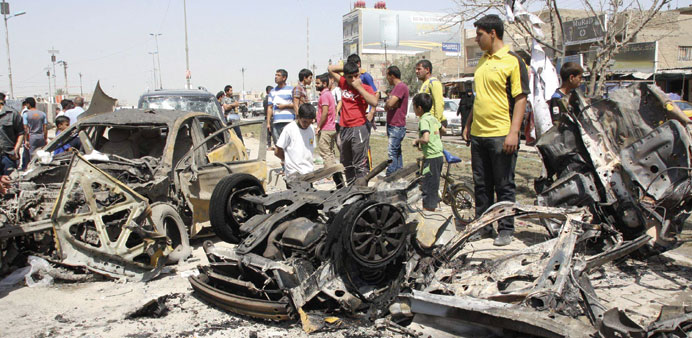AFP
Attacks, including 13 car bombs in mainly Shia-populated areas of Iraq, killed at least 18 people yesterday, highlighting the persistent danger from militants 11 years after American forces took Baghdad.
The latest violence is part of a protracted surge in nationwide bloodshed that has killed more than 2,400 people so far this year and sparked fears Iraq is slipping back into the all-out sectarian fighting of 2006-7.
The unrest has been driven principally by complaints among the Sunni Arab minority of mistreatment at the hands of the Shia-led government and security forces, as well as spillover from the civil war in neighbouring Syria.
Eight car bombs struck seven separate areas of Baghdad around 10am, killing at least 11 people and wounding at least 49, security and medical officials said.
In the deadliest single attack in the capital, a car bomb exploded near a traffic police office in the Shia shrine district of Kadhimiyah, killing at least three people and wounding at least eight.
Another car bomb exploded near a vegetable market, while main thoroughfares were also targeted.
Five more car bombs struck various areas of Wasit province, south of Baghdad, killing at least six people and wounding more than 40, a police officer and a health department official said.
And in the Saba al-Bur area north of Baghdad, two mortar rounds killed at least one person and wounded at least five.
The attacks highlight the persistent danger posed by militants in Iraq, 11 years after American troops took Baghdad.
The United States subsequently disbanded the Iraqi military and launched a “de-Baathification” programme targeting members of Saddam Hussain’s party, both of which contributed to the rise of a bloody insurgency.
And while many Iraqis had high hopes after Saddam’s 2003 overthrow, they have been dashed by years of deadly violence, widespread corruption and a persistent lack of basic services.
Yesterday’s bloodshed came a day after Iraq’s security forces said they killed 25 militants near Baghdad.
Brigadier General Saad Maan said the fighters were part of the jihadist Islamic State of Iraq and the Levant (ISIL).

